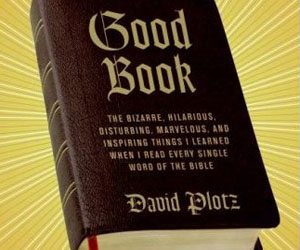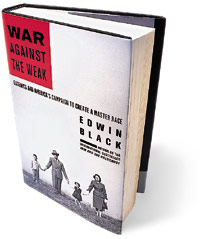
This is a Mother Jones podcast. To download or subscribe to our free weekly podcasts, visit our podcasts page or the Mother Jones iTunes store.
Slate.com editor David Plotz was flipping through the Torah at a cousin’s bat mitzvah when he found a tale of murder, rape, and betrayal that he’d never heard of before. Intrigued, he began reading the Old Testament, word for word, and blogging about it on Slate. Jen Phillips spoke with Plotz about his new book, called Good Book, which explores some of the least-known passages from the world’s most-read book.
Mother Jones: David Plotz, thanks so much for talking with Mother Jones.
David Plotz: Thank you.
MJ: So we’re going to be talking about your book, Good Book, and it’s basically—tell me if this is right—it’s a collection of your Slate.com series Blogging the Bible?
DP: It’s based on my Slate series Blogging the Bible. Blogging the Bible was a series I did for Slate a couple of years ago where I, as the title suggests, blogged the Bible, the Hebrew Bible, the Old Testament, as Christians would call it, and wrote daily responses to what I was reading. I’d started in the beginning, with Genesis, and just kept going and wrote daily responses, and responded to my readers, and it had a kind of immediacy and quickness that blogs do. But for the book, it had to have a different kind of tone and had to do something different than what I was doing with the blog. So the blog, in order to make a really good book out of it, I rewrote the whole thing and cut out a lot of, there was a lot of extraneous stuff in the blog that didn’t really fit in a more considered book.
And I think that one of the most interesting things as a writer and journalist is that so much of first-draft writing these days is in blog form. And the blog-to-book migration is a very interesting migration; it’s a new kind of book writing.
MJ: Yeah, I was wondering about that, because the Bible has been so widely interpreted. And in the intro, you’re very clear that you’re not a scholar. So when you’re turning the blog posts into the book, did you do any study of the historical or religious aspects of the Bible?
DP: Very, very little. I did a teeny bit because there were occasional questions that came up and I thought it would be really nice to have a good historical answer here or to know what the scholarship was. But for the most part I tried really, really hard to avoid it because I think the best part about the book is that it’s written by somebody who’s coming to this book fresh and unspoiled by having this beaten into him by his rabbi or minister or professor. I’m virgin territory. And that kind of independent and naive, curious enthusiasm is the voice of the book and I found myself actually, when I did talk with a couple of scholars as I was finishing things up, that I had this instinct after I talked to them to go and modify things and make them a little more somber and I didn’t want that. The book needs to be, the whole point of doing it this way, the whole point of having an “average Job” reading the Bible like this and write about it, is to avoid the heaviness that comes with the Bible and give it this kind of irreverence and lightness and fun that will make people enjoy the book and hopefully enjoy the Bible itself.
MJ: I found it interesting that, as you know, there’s this kind of similar book by A.J. Jacobs called The Year of Living Biblically. And I found it interesting that both you and he identify as Jewish, but you’re not Orthodox, and both these books came out not too far apart from one another. Do you have any theories as to why you two, with somewhat similar backgrounds, wrote these books around the same time?
DP: It’s funny because I was blogging as A.J. was getting his book ready, so we ended, learning about each other’s projects, we ended up becoming friendly. His is a really great book, which I hope people buy after they buy my book. I think there’s something in Judaism which invites this kind of irreverence. We’re at a time when people are very conscious about faith. You have a lot of religion talk in the world, and you have lots of people like me who are culturally quite Jewish but not educated in a way, and don’t have the time or energy or will to throw ourselves into serious religious study. I don’t want to become a really Orthodox, kosher Jew; that has no great appeal to me.
But there is this tradition in Judaism, and you see it actually running through the Bible, of just irreverent doubt. And the great examples of it, some serious, some less serious, but at the most serious level, Abraham, when God is about to destroy Sodom and Gomorrah, Abraham tells God why he shouldn’t do it and makes God promise not to destroy it if there are any just people who are living there. And you have Moses, who’s always arguing with God, or you have Job who litigates against God, and there is this very strong Jewish tradition of getting into a fight about God, and about scripture…
MJ: Well, and with God, they’re actually fighting…
DP: Right, and one reason I think Jews are the way we are, why Judaism produces so many great lawyers and maybe even writers and arguers, is that the Bible itself and Judaism itself, it’s founded on…God is always talking about how merciful and compassionate he is, but actually the God of the Hebrew Bible is unmerciful and uncompassionate and a very difficult God to love or even like. And the book does not have any kind of clear moral lesson or any moral to it. So what do you have to do when faced with this? You argue with it, and that’s what the years of Talmudic commentary are and that’s what the religion is founded on, this notion that scripture is confusing and difficult so let’s argue our way out of it. And so I realized as I went along with this that I was part of this very strong Jewish tradition, a kind of fundamental tradition. I think it’s much less strong in Christianity, because the New Testament is a loving and redemptive book in a way the Old Testament isn’t.
MJ: Right, and I found it interesting that in the Old Testament, God seems to favor these prophets who bicker and bargain with him, and he really values intelligence and not so much devotion. In fact, I think in a couple places he actually kills his faithful. Is that right?
DP: Yeah. There’s the famous example of Jephtha’s daughter. Jephtha’s a great warrior; he’s actually a mobster who turns into a warrior who leads the Israelites to victory. And to honor God he vows to kill the first thing at his door when he gets home. I don’t know why he makes this vow. So he gets home and his daughter, his only child, is waiting for him. So he kills her. And she’s this complete innocent, she’s faithful, and she willingly submits to it. And it’s utterly baffling that God doesn’t step in to intervene or doesn’t seem to care. The faithful are not…God is much less interested in faith than he is interested in…he talks about how he’s interested in obedience, but he’s really not that interested in obedience. He’s interested in a good tussle. He loves to tussle.
MJ: He sure does love…they just kill so many people in the Old Testament, I’m kind of surprised there’s anyone left. Every other chapter it seems they’re killing 10,000 Moabites or…
DP: Someone should add all the numbers up. There are the 185,000 Assyrians who are stricken by plague, or the 24,000 Israelites who die from eating too much quail, and it’s amazing. The level of death is…and sometimes the level of death is on a Stalin or Mao scale, so the big numbers don’t actually mean that much. It’s much more when they do the deaths in close-up. So there’s this incredible scene where Joshua has just killed all the Amalekites except their five kings. He’s killed tens and tens of thousands of people. But then the five kings, he steps on their throats…
MJ: Jesus.
DP: …and cuts their necks and kills them. And that sticks with you, like ‘Ah, God, this is barbaric,’ in a way the death of 10,000 doesn’t.
MJ: And do you believe that the Bible actually does work as a history, that things depicted in it did actually happen?
DP: There are things depicted in it that did actually happen. They are not the things that people are that interested in. There was a king Hezekiah. The things that did actually happen take place much later in the book. Basically nothing before King David seem to have any foundation at all.
MJ: Some of the stories you’d want to hear about, like the Maccabees and the Hannukah story, they’re not in the Bible, right?
DP: Right, that’s the most surprising one that’s absent, is the Hannukah story is not in there. But there’s a lot of stuff that is in there that just doesn’t get a lot of emphasis. There are these incredible stories that we don’t know very well, which I’m always sad—that’s the reason I think why everyone has to read the Bible. There’s all this incredible stuff that we just miss because the selections that are popular—Noah, Jacob, Adam and Eve, the Exodus, King David—are just a tiny, tiny little bit of the whole book.
MJ: I found it interesting that people in the Bible are always sacrificing animals to God, and God seems to really like it. Do you think there’s a modern version of this? Should we be sacrificing our iPods to win God’s favor?
DP: Ooh, that’s a really interesting question: What is the modern version of sacrifice?
MJ: The PETA version…
DP: How do you appease God? I guess one of the things, there’s this transition even within the Bible. So God, at the beginning of the Bible, very much needs to be appeased. Your general position is that God is angry and you have to assuage him. As the Bible progresses that’s less and less true. God becomes less a god of anger and more a god of love or a god of indifference. He doesn’t take that kind of active interest in daily life whereby you have to be constantly checking in with him and buy him off with dead cows.
MJ: So you think God’s mellowed with age?
DP: God mellows a little bit. Well, he obviously mellows a huge amount by the time you get to the New Testament, but even in the Old Testament he becomes…It’s not necessarily that he mellows; he just becomes more distant. He’s much less involved. So at the beginning of the Bible he’s like a father, so he’s in your face all the time. He is the father. There’s this moment where Adam and Eve go wandering off and sort of hide in the Garden of Eden because they’ve done wrong, and God has to walk through the Garden of Eden looking for them, just like he’s lost his kids at the mall or something; he’s really irritated about that. And later on, he just absents himself for hundreds of years at a time. And he’s more like a principal or something. He’s not in your face at every moment the way he was at the beginning of it.
MJ: One thing that I noticed, maybe more early on rather than later, is that there is a lot of idol worshipping and God seems very insecure about it. And I couldn’t really tell if God is so opposed to idol worshipping because there are other gods. And I didn’t know if the Israelites thought their God was the only God, or if it was just the best god among many. And did you ever come to any conclusion about that?
DP: Yes, that is one of the great questions of the Bible. So Judaism allegedly invented monotheism; that was one of our great inventions to the world. But as you read the Bible you realize that they don’t seem to be monotheists. Especially at the beginning. At the beginning it’s pretty clear that there are other gods and that God is just the best among them. He’s the top god, the top dog. But there’s a subtle shift that occurs, and you see it explicitly in Deuteronomy and in Prophets, where it stops being that the Jews are polytheists who believe that Yahweh is the top god, and it becomes instead that they’re monotheists who believe that these other gods are fake. So you see this progression.
MJ: I was just wondering if for this Passover, you and your family were going to celebrate any differently than you had before you wrote this book.
DP: No, I don’t think we will. My own Judaism has been quite shaken by reading the Bible and so my faith in God and love of God is not what it was a few years ago. But my love of Jewish tradition hasn’t changed at all, and I think one of the great powers of Judaism, especially in modern American society, is that it permits a kind of practice that isn’t contingent on faith. So the power of a seder for me doesn’t have much to do with my faith that God has brought us through it. It has a lot to do with my sense of historical continuity to the suffering of the Jewish people and suffering of people generally. And honestly, more importantly, the fact that I love the idea of these ritualized family gatherings. It’s just meaningful to me. But the God part is not the meaningful part anymore; it’s the family and historical continuity.
MJ: But you did say that you kind of gained more understanding of where these traditions come from from reading the Bible.
DP: Right. Now I know, for example, that the words we speak, how we’re to speak about the Passover events, comes from the book of Deuteronomy, so I’m a more sophisticated consumer of what’s happening. But I don’t want to have a four-hour seder instead of a one-hour seder. It hasn’t made me think, like, I’ve really been missing out on something. It’s just made me a little more sophisticated about what I know.
MJ: Well, David, thanks so much for speaking with us about your book.
DP: It’s my pleasure, Jen.















